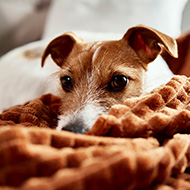Increase in missing dogs during fireworks season

"Our statistics sadly show that there really are devastating and long-term consequences when fireworks strike dogs with a sense of terror unexpectedly" - Mark Beazley.
The Kennel Club has today (1 November), released statistics which show an increase in dogs going missing during fireworks season.
Using data from Petlog, a lost and found pet database run by The Kennel Club, the organisation has shared that in the first two weeks of November 2021, 34 per cent of dogs were marked as missing by their owners, in comparison to the following two weeks.
Following the release of these statistics, The Kennel Club, along with other animal and human welfare groups, is holding an event in Parliament today to urge the Government to conduct a review into fireworks legislation.
At the event, the organisation will recommend that fireworks should be restricted to licensed events, that the maximum decibel limit of fireworks and suggest the introduction of a fixed penalty notice system for firework misuse.
Chief executive of The Kennel Club, Mark Beazley, said: “The element of surprise is one of the key factors in what makes fireworks uniquely distressing for dogs.
“If owners can anticipate fireworks, they can manage this distress in a way that works for their dog, and we’re asking Government to recognise this and review legislation, for the sake of the nation’s pets.
“Our statistics sadly show that there really are devastating and long-term consequences when fireworks strike dogs with a sense of terror unexpectantly [sic], with thousands of dogs running away, behaving out of character and showing clear signs of fear and distress every year.
“Whilst we urge Government to consider our recommendations to protect dog welfare, we are also urging caution from owners this fireworks season. Each dog reacts differently and it is important that owners know what do to and how they can help their four-legged friend and keep them safe.”



 BSAVA is to partner with BVA Live (11-12 June 2026) to champion clinical research.
BSAVA is to partner with BVA Live (11-12 June 2026) to champion clinical research.